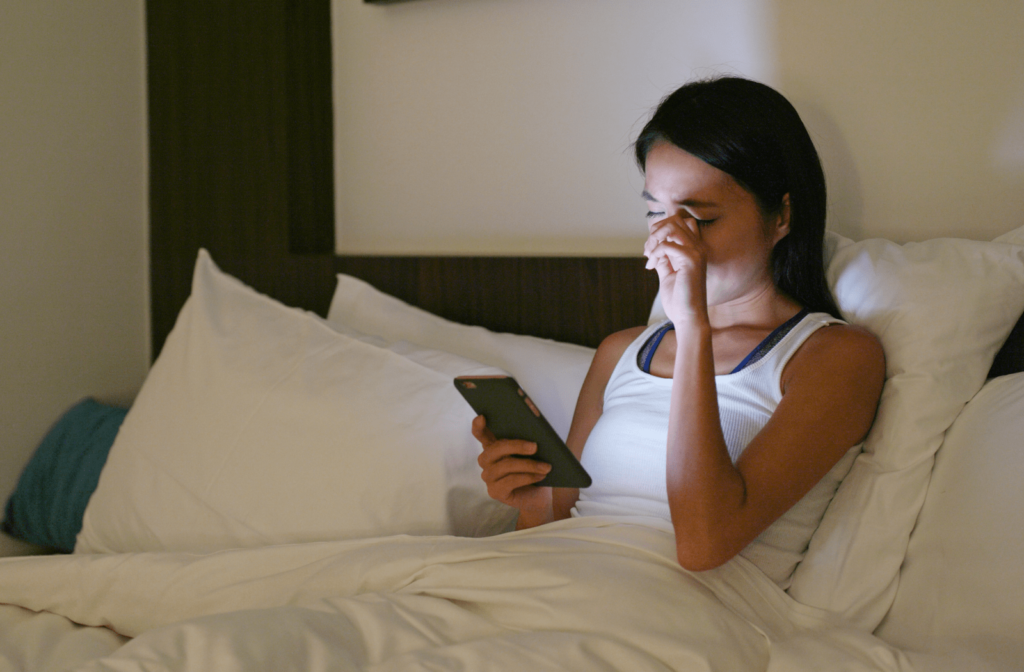Are you one of the millions of Americans who experience dry eyes? Common symptoms of dry eyes include discomfort, burning, a gritty feeling, and possibly blurred vision from lack of tear production or increased evaporation of tears.
Regularly scheduled eye exams can help diagnose dry eyes and determine the underlying cause. Dry eye testing and treatments can alleviate discomfort for clearer vision.
Dry eyes can affect your day-to-day life, but did you know symptoms can also flare up at night? We discuss the likely causes of dry eyes at night, the symptoms, and what to do to prevent or alleviate this issue.
Causes of Dry Eyes at Night
Dry eyes during the day have similar causes to dry eyes at night. Essentially, dry eyes occur when there’s a lack of tear production or an imbalance in the tear film, affecting lubrication in the eyes. This imbalance can be caused by:
- Your age: Tear production decreases as you age
- A hormone imbalance: Pregnancy, contraception, & menopause
- Certain health conditions: Rheumatoid arthritis, diabetes, & thyroid conditions
- Medications: Antihistamines, decongestants, & blood pressure medications
- Blepharitis & other eye conditions: Inflammation of the eyelids
- Environmental factors: Smoke, wind, & dry air
Dry eyes can worsen throughout the day and intensify symptoms at night. The causes of dry eyes at night can include:
- Digital devices: Extended periods in front of screens can cause digital eye strain & dry eyes.
- Infrequent blinking: Reduced blink rate produces fewer tears & can cause dry eyes.
- Contact lens use: Long periods of contact lens wear during the day can cause dryness at night.
- Nocturnal lagophthalmos: A condition where the eyelids don’t fully close at night. Weakened or damaged eyelids prevent a complete seal & cause moisture evaporation.
- Dehydration: Not drinking enough water during the day can affect your eyes.
Symptoms of Dry Eyes
You can experience the following dry eye symptoms during the day, night, or morning:
- Burning or stinging sensation
- Burning around the eyelid
- Gritty feeling in the eye, like sand
- Itchiness & redness
- Eye fatigue
- Blurred vision
- Sensitivity to light
- Difficulty with nighttime driving
- Difficulty wearing contact lenses
- Stringy mucus from eyes
- Watery eyes
Diagnosing & Treating Dry Eyes
Regardless of whether you experience dry eye symptoms during the day or at night, dry eye testing can help find the underlying cause. The eye doctors at The Eye Care Team use:
- TearLab® Osmolarity System: Determines the composition of your tears
- TearScience® LipiView®: Checks your meibomian gland structures & blink rate
- InflammaDry: Checks for inflammation
- OptiLight IPL: Intense Pulsed Light or IPL treatment uses intense broad-spectrum light to address and reduce inflammation
Treatment for the night and early morning dry eyes can include:
- Artificial tears: Preservative-free, over-the-counter artificial tears can prevent irritation & offer short-term relief.
- Ointments or gels: Moisturizing ointments & gels can offer extended relief compared to artificial tears. Use in small amounts if driving at night, as they can cause blurry vision.
- Prescription medication: These can be eye drops or oral medications that increase tear production or reduce inflammation.
- Lipiflow: This revolutionary technology applies gentle heat & pressure to the eyelids to remove blockages in the meibomian glands for those with meibomian gland dysfunction.
- Punctal plugs: These tiny plugs are inserted in the tear ducts to prevent tears from draining too quickly.
Managing Dry Eyes at Night
Along with in-office and at-home treatments, there are several things you can do during the day and at night to manage your dry eyes and prevent nighttime dryness:
- Use a humidifier at work or in your bedroom to add moisture to the air, especially during dry or cool seasons.
- Wear protective glasses when outside or switch to eyeglasses from contact lenses in the evenings or when you experience dry eye symptoms.
- Avoid going out in smoky or polluted environments.
- Apply a warm compress to your eyes at night & gently massage the glands.
- Drink water throughout the day to stay hydrated.
- Use an eye wash or eyelid cleaner to remove dirt, irritants, or buildup before bed.
- Use eye drops before bed.
- Limit screen time before bed & take frequent breaks when using digital devices during the day.
- Wear a sleep mask at night if your eyelids don’t close completely when you sleep.
- Wash your bedding regularly to prevent irritation from dust or pet hair.
Relief from Nighttime Dry Eyes
Dry eyes during the day can cause discomfort, among other symptoms, and dry eyes at night can affect the quality of your sleep. If you start experiencing dry eyes at night, it’s time to visit your eye doctor.
Knowing the cause and severity of your dry eyes can help determine the best treatment plan. Book an appointment with The Eye Care Team today for dry eye relief.



